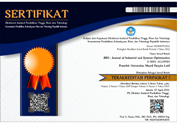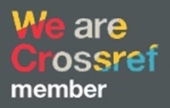ANALISIS FAKTOR-FAKTOR YANG MEMPENGARUHI PERSEPSI MAHASISWA MELAKUKAN INVESTASI SAHAM DI BURSA EFEK INDONESIA
DOI:
https://doi.org/10.51804/jiso.v4i1.55-60Keywords:
capital market, investment, investors, perception, stocks, stock exchangeAbstract
ABSTRAK
Kinerja pasar modal Indonesia merupakan terbaik kedua di dunia. Namun demikian jumlah investor lokal masih kurang menggembirakan yaitu masih sekitar 0,32% dibandingkan dengan jumlah penduduk. Literasi tentang pasar modal masih menunjukkan gambaran yang memprihatinkan, padahal upaya pemerintah untuk memberikan edukasi pasar modal sudah sedemikian gencar melalui pelatihan-pelatihan yang diadakan oleh pihak bursa efek dan OJK maupun pembebanan terhadap kurikulum pada perguruan tinggi. Disamping itu kampus diharapkan bekerja sama dengan perusahaan sekuritas sehingga memungkinkan para mahasiswa belajar berinvestasi dengan dana yang sangat minim, agar mahasiswa dapat praktek secara nyata dalam upaya memotivasi para mahasiswa sebagai insan yang berpendidikan tinggi untuk menjadi investor.Penelitian menggunakan sampel mahasiswa yang telah mengikuti mata kuliah Pasar modal dan Analisis Investasi dan Manajemen Portofolio. Hasil pemrosesan data dengan menggunakan Analisis Faktor didapat hasil bahwa mahasiswa FEB Untag Surabaya yang telah menempuh mata kuliah “Pasar Modal” dan “Analisis Investasi dan Manajemen Portofolio” tidak segera mendaftar sebagai investor dikarenakan merasa “tidak mempunyai dana”, “dilarang orang tua” , dan “tidak tertarik”. Dari hasil pemrosesan lebih lanjut data terdapat gambaran bahwa mereka berpendapat bahwa berinvestasi pada surat berharga saham itu “tidak menguntungkan” dan “berivestasi di bursa efek itu rumit” dan juga “tidak mempunyai dana”. Didalam kenyataannya persepsi itu tidak benar. Untuk berinvestasi saham tidak perlu dana yang besar, padahal berinvestasi pada surat berharga saham sangat menguntungkan hal ini bisa dilihat dari perkembangan Index Harga Saham Gabungan yang terus meningkat. Dan juga berinvestasi saham tidak rumit karena bisa dilakukan dengan cara online.
ABSTRACT
The performance of the Indonesian capital market is the second best in the world. However, the number of local investors is still less encouraging, which is still around 0.32% compared to the total population. Literacy on the capital market still shows a worrisome picture, even though the government's efforts to provide capital market education have been intense through trainings held by the stock exchange and OJK as well as the imposition of the curriculum on universities. Besides that, the campus is expected to cooperate with securities companies so as to allow students to learn to invest with very minimal funds, so that students can practice in real terms in an effort to motivate students as highly educated people to become investors. The study used a sample of students who had taken courses in Capital Markets and Investment Analysis and Portfolio Management. The results of data processing using Factor Analysis showed that FEB Untag Surabaya students who had taken the courses "Capital Market" and "Investment Analysis and Portfolio Management" did not immediately register as investors because they felt "no funds", "forbidden by parents", and "not interested". From the results of further processing of the data, there is an illustration that they think that investing in stock securities is "not profitable" and "investing in the stock exchange is complicated" and also "does not have funds". In reality that perception is not correct. To invest in stocks, you don't need large funds. even though investing in stock securities is very profitable, this can be seen from the development of the Composite Stock Price Index which continues to increase. And also investing in stocks is not complicated because it can be done online.
References
Cravens, David W dan Piercy, Nigel F, 2013. Strategic Marketing. Mc.Graw-Hill International Edition, Tenth Edition, 2013.
Engel, James. 2003. Consumer Behavior, Mason : Permissions Departement, Thomson Business and Economics.
Hermanto. 2015 Perilaku Mahasiswa Ekonomi di Universitas Esa Unggul dalam Melakuan Investasi di Pasar Modal.
Kotler, P. 2005, Manajemen Pemasaran, Buku 2, Penerbit Salemba Empat, Jakarta.
Kotler, Philip dan Keller, Kevin Lane, 2009. Manajemen Pemasaran. Penerbit PT. Macanan Jaya Gemilang, Edisi 12, Jilid 1,2, Tahun 2009.
Kotler, Philip dan Keller, Kevin Lane, 2009. Manajemen Pemasaran. Penerbit PT. Gelora Aksara Pratama, Edisi 13, Jilid 1.
Mangkunegara, Anwar, Prabu, 2012. Perilaku Konsumen. Penerbit Relika Aditama, Edisi Revisi.
Mintarja Endang, Ahsin Abdul Wahab & Uki Masduki. 2017. Hubungan Pengajaran Mata Kuliah Ekonomi Islam Terhadap Minat Mahasiswa Menabung di Bank Syariah. Journal of Multidisciplinary Islamic Studies. Vol 1 No. 2
Nitisusastro, Mulyadi, 2013. Perilaku Konsumen Dalam Perspektif Kewirausahaan. Penerbit Alfabeta Bandung,Cetakan Kedua.
Peter, J. Paul dan Olson, Jerry C, 2014. Perilaku Konsumen & Strategi Pemasaran. Penerbit Salemba Empat, Edisi 9, Buku 2, Tahun 2014.
Sugiyono, 2016. Metode Penelitian. Kuantitatif, Kualitatif, dan R&D. Penerbit Alfabeta, Bandung, Cetakan ke-23.
Sumarwan, Ujang, 2003, Perilaku Konsumen Teori dan Penerapannya dalam Pemasaran, Penerbit Ghalia Indonesia, Cetakan Pertama, Tahun 2003.
Downloads
Published
Issue
Section
License
With the receipt of the article by JISO Editorial Board and the decision to be published, the copyright regarding the article will be transferred to JISO. The copyright transfer form can be downloaded here.
JISO has the right to multiply and distribute the article and every author is not allowed to publish the same article that was published in this journal.
JISO is licensed under a Creative Commons Attribution-ShareAlike 4.0 International License.
Under the following terms:
Attribution — You must give appropriate credit, provide a link to the license, and indicate if changes were made. You may do so in any reasonable manner, but not in any way that suggests the licensor endorses you or your use.
ShareAlike — If you remix, transform, or build upon the material, you must distribute your contributions under the same license as the original.














